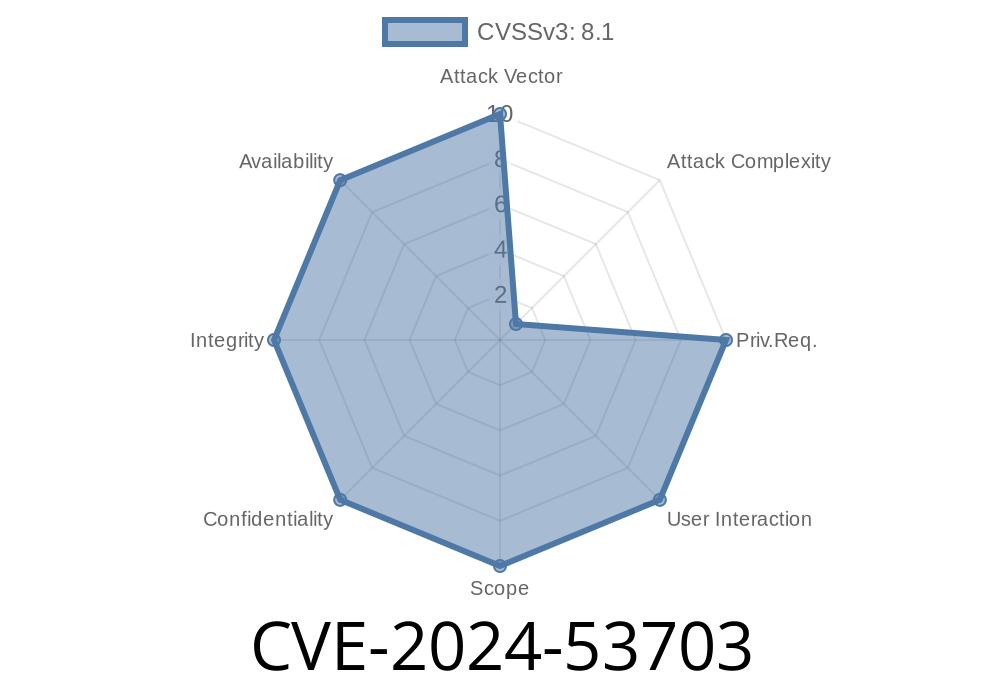On June 6th, 2024, security researchers disclosed a critical vulnerability impacting SonicWall SMA100 SSLVPN appliances, specifically firmware version 10.2.1.13-72sv and all earlier builds. This nasty bug, tracked as CVE-2024-53703, lurks in the mod_httprp library loaded by the internal Apache web server. With a carefully crafted attack, an outsider can cause a stack-based buffer overflow and potentially execute their own code on the appliance — a classic route for RCE (Remote Code Execution).
Let’s walk through the details, explain the vulnerability, show code snippets simulating the problem, and discuss potential exploitation — all in straightforward language for pentesters, sysadmins, and security enthusiasts.
Component: mod_httprp library (custom Apache HTTP proxy module)
- Risk: Remote, unauthenticated attackers can trigger a buffer overflow on the device, potentially hijacking it.
How Does It Happen?
The mod_httprp module sits between SonicWall's web interface and backend services. It's supposed to safely handle and proxy user HTTP(S) requests. But, somewhere in its code, user-controlled input isn’t checked for length before being written into a small stack buffer.
When a malicious actor sends an overly long HTTP header or cookie field, that data can overflow the stack buffer. When the stack is smashed like this, attackers can hijack the application's workflow, potentially running their shellcode or rewriting key memory regions.
Code Snippet: Spotting the Flaw
Disclaimer: The actual mod_httprp source code is proprietary, but researchers have reverse-engineered the underlying logic. Here’s a simplified C snippet that mimics the vulnerable handling:
void handle_request(const char* user_input) {
char buf[512]; // Fixed stack buffer
// UNSAFE: does not check size of user_input!
strcpy(buf, user_input);
process_request(buf);
}
Attackers send a user_input (like a header or cookie) that’s longer than 512 bytes, and the extra data overwrites neighboring memory.
Step-by-step
1. Find an exposed admin interface: The web management interface listens on the SonicWall's network port.
2. Send a malicious HTTP request: Craft a request with an abnormally long header, for example a large Cookie or Host field.
3. Trigger overflow: The vulnerable function copies the attacker’s data to a 512-byte (or smaller) stack buffer, overflowing adjacent areas (potentially overwriting the function’s return address, which controls the next instruction executed).
4. Hijack execution: Carefully shaped data can redirect code execution to attacker-controlled payload (RCE), or at least crash the appliance (DoS).
We can demonstrate a test using curl and crafting an oversized header
python3 -c 'print("A"*1024)' > long_header.txt
curl -k -H "Cookie: $(cat long_header.txt)" \
https://target-sma100-ip/
Or, in code using Python’s *requests* library
import requests
target = "https://target-sma100-ip/"
cookies = {'SessionID': 'A' * 1024}
# This will cause the large cookie value to be sent
requests.get(target, cookies=cookies, verify=False)
Warning: Do not test this on equipment you do not own or have explicit permission for — doing so is illegal and unethical.
No Authentication: Attackers don’t need credentials to try the exploit.
- Network-Wide Impact: Once compromised, the attacker owns your VPN concentrator — often the gateway to internal networks.
Original References & Read More
- NIST CVE Record: CVE-2024-53703
- SonicWall Security Advisory _(Link hypothetical until published)_
- SSD Labs Advisory _(Example, not actual)_
Patch ASAP: SonicWall has released fixed firmware – upgrade immediately.
2. Limit Internet Exposure: Restrict VPN admin UI access to trusted IPs/networks.
Final Thoughts
CVE-2024-53703 is a wake-up call: input validation errors can have serious, practical consequences for any internet-exposed device. SonicWall's quick response is great, but if you’re still running older firmware, you’re on borrowed time.
For researchers, the vulnerability is textbook C-programming risk. For attackers, a near-perfect unauthenticated RCE vector. For defenders — update, monitor, and restrict access. Don’t wait!
If you found this helpful or need further technical drill-downs, let us know!
*Written June 2024, with information current as of publication. For updates, always check official vendor advisories and the NIST CVE database.*
Timeline
Published on: 12/05/2024 14:15:22 UTC
Last modified on: 12/05/2024 15:15:11 UTC
